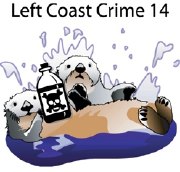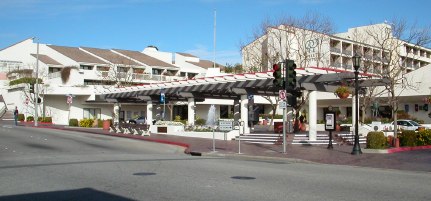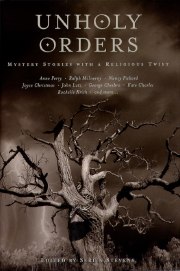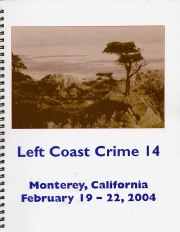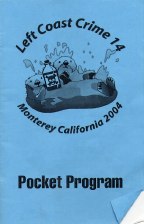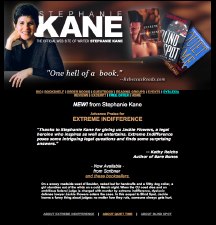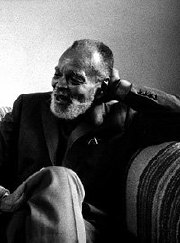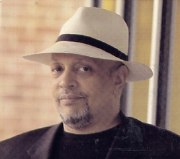Left Coast Crime 14
The Calm Convention
The Agony Column for March 31, 2004
Commentary by Rick Kleffel
The Calm Convention
The Agony Column for March 31, 2004
Commentary by Rick Kleffel
At WorldCon, the fans can attend panels to hear the authors speak about their work directly, or about common themes in their work. For example, at Torcon, you'd have had a hard time evading a panel on the "Singularity". Or at least I did. Not that I minded, but it's interesting to see what ideas take hold of a creative writing community and how they manifest themselves. In general however, both Worldcon and Spookycon seemed to be based on the presumption that there were fans and pros, and that pros would in general entertain the fans, either by direct readings, or indirect readings, that is the panels. Fans and pros definitely occupied different strata. Left Coast Crime proved to take a different approach. In the first place, it was a lot smaller than WorldCon. This was actually a great benefit. While the World Fantasy Convention in Monterey in 1996 had seemed a bit moribund, Left Coast Crime was positively bustling, but not unpleasantly teeming as had often been the case with WorldCon. In part this was because there was a perfect match up between the venue and the convention itself. Monterey, California is a gorgeous, beautiful small town on the California Coast. The downtown area is pretty much all within walking distance of the Convention Center. That means you can stroll from the justifiably world-famous Monterey Bay Aquarium, past Cannery Row, to the Convention Center, thence to a typical small-town downtown filled with a nice quota of good restaurants, book stores and whatnot shops. There's a cohesion that makes the locale a naturally relaxing place to visit.
The Convention Center itself is pretty much in the middle of everything. It's not so big that you can get lost in it, or that you will literally have to run from one end to the other should subsequent events be scheduled in one end and the other. It seems pretty much brand new, or if not, recently renovated and cleaned up. It doesn't smell bad, and it doesn't reek of cheap. Just outside the convention center, there's a nice enclosed courtyard, where participants in the convention can chat between seminars. The rooms range from the usual close'em off with partitions and stuff 'em full of chairs to more luxurious auditoriums with theater-style seats. Even the sardine-tin-wannabes seemed cozy rather than claustrophobic, though that could have been attributed to my good mood. The drive from my house to the Monterey Bay Convention Center is 35 minutes of lovely California coast cruising. Left Coast Crime itself fit perfectly into this center. At any one time, there were three to four events scheduled simultaneously. This put two in the smallish -- let's call them "cozy" rooms, and two in the larger rooms. The rooms were all quite close and in the center was the registration and signing area. One of the things that LCC did quite right was to have authors who had just participated in a panel proceed directly to a signing in this area after their panel. It made it easy to know where and when to go to get the signature of an author you had just heard speak. On the downside, if you were on your way to another event, and there were plenty of reasons to do so, then you'd either miss the signing or part of the event. But authors were signing early often and with great generosity.
Scheduling is a vitally important part of running any literary convention. It's the Achilles' Heel of con programming, but LCC was easily the best run con in this regard that I've ever attended. The panels were 45 minutes -- period. Always. This left plenty of time to chat afterwards and reach the next panel. It also left the audience in a 'wanting more' as opposed to a 'wishing for less' mode, which, on the balance is good. Good, at least, if you've ever been trapped by your courtesy in a panel wherein some blowhard was monopolizing the time at end while the rest of you are just waiting to get OUT! One of the more indefinable and perhaps less talked about aspects of any convention is the butthead factor. You know what I'm talking about. The jerk who asks the totally inappropriate question in the seminar. The cringe-inducing blowhards who are there to insult one of the panelists. Or -- my favorite -- the participant who wants to make a speech, and does so by simply framing it as a question. They usually think they know far more than anyone else and are willing to take an inordinate amount of time demonstrating, in their own minds, that this is so. Good thing the audience is not equipped with paintball weapons. Or not. Maybe we should be. Then there are those who attend a literary convention with a political agenda. Thanks, but the door is THAT way. No matter how good the panel or the panelists, the audience can make or break a panel. People who ask short, smart questions that actually further the discussion and stimulate the panelists make a panel better. Someone who stands up to offer a public butt-kiss can cause the rest of the audience to frantically twist their mysteriously inactive invisibility switches. Damn things never work when you need them. I have to say that I really only experienced one butthead incident in the entirety of this convention, which says a lot for the erudite and very entertaining audience. But let's give the organizers their due. In one rather large panel, an audience member decided to offer up what he thought to be some utterly true political commentary, which much of the audience clearly thought was blank-wing BS. The moderator was polite but was also able to politely shut the offending speaker up and keep the offending trap closed. It was excellent work, appreciated by the audience and the panel alike.
In theory. In practice, what you get is a mess of people who've spent too many hours traveling in the cramped, uncomfortable and annoyingly intrusive world of modern commercial airliners dragging their exhausted and already tetchy selves to a hotel in Godforsaken, West Nowhere only to have a schedule shoved in their hands confirming their appearance on a panel covering a subject about which they know nothing and indeed want to know nothing. Shoved from one panel to the next in a schedule that requires they literally run from one room to the next, they show up short of breath, shorter of temper and understandably uninspired to bluff their way through a panel on a subject they've thought about on the run from the last panel, especially since they might, like, be attending another panel that is about their specialty. I won't say that the above is my sole experience, but I can say I've seen it happen too often. The audience can't help but feel bad for people they respect being treated with apparent disrespect, or more accurately, disinterest. It's not just about filling up slots.
Like everything else, I arrived late for LCC. Hell, I even signed up late, letting the deadline pass so that I missed out on a couple of events that, in retrospect, I would have loved to attend. But it was Friday, February 20, and I found myself in my car racing down to Monterey in fairly typical overcast weather. Rain showed up now and again. The first round of panels I was to attend was the 11 AM set. It was a pretty delectable set of tough choices. 'The Reader's Viewpoint: Fans, Booksellers, Collectors, Writers --what they read and why' is something I'm of course interested in. To a certain extent, I might have been a decent choice to participate in that panel. Then there was 'Travel Guide to Long Ago: Historical authors discuss the settings of their characters'. I do enjoy historical mysteries, but my interest is really sporadic. To my mind, you could spend a lifetime reading only in this subgenre and you might miss out on a thing or two outside of it. But. But. Now, 'The Wild Bunch: Where did all these weird people come from and what are they doing in my book? The ensemble crime novel' is something I would have been particularly interested in, especially in my now perfect hindsight. But given that Meredith Blevins was going to be in 'Weird Jobs for a Sleuth', a subject of vital interest to me, I chose that panel and I chose quite wisely. As a reader, I don't want to read mysteries that are just about cops. That would get boring. So hearing how writers who don't have cops for sleuth/protagonists choose their professions so as to yield up a good mystery was a fascinating experience. As a writer, since I'm not a cop, I'd be hard pressed to write one (which doesn't mean I haven't tried to do so). So hearing how published writers have managed to make careers out of non-police sleuths was something I was definitely interested in. The panelists themselves? Fascinating, and many candidates that sounded fully worth reading. Of course, we're all familiar with Meredith Blevins and her married-to-the-gypsies sleuth. It's an intriguing approach, because it allows her to give her books a steep, heavy Gypsy flavor without forcing her to toe the Gypsy line. Bill Moody spoke eloquently about his jazz-playing sleuths. I was particularly fascinated by Donna J. Ferguson's sea-urchin diver stories. Anyone who says that sensual writing is writing designed to "make you experience the smell of docks where they've gutted fish for 20 years" has an artistic line on writing that's hard to argue with. John Billheimer talked about Owen Allison, his transportation investigation consultant whose occupation allows the writer to treat a wide variety of subjects that involve mysteries but not the traditional murder investigations. Joyce Krieg makes the most of her time in the contentious world of talk radio. All in all, a fascinating look at how writers put their own experience to use in genre writing. And my first hint as to the audience of this entire conference; aspiring writers.
'What's Hot, What's Not? Trends in Crime Fiction' was a fascinating exercise in frustration for all involved. This is not to say that the panel was badly put together or ill-informed. But there was a quick consensus that what was hot now was something that was of absolutely no use to those who were now in the process of contemplating or composing a novel. It was quickly made clear that anything in process now could not possibly appear for at least a year and more likely two. So in terms of it's usefulness for writer, rather on the zippo side. But in terms of hilarious publishing talk, nobody beat agent Kimberley Cameron who quipped about getting 25 "Da Vinci Code" wannabes per day. Agony Column favorite Win Blevins, an editor for Tor/Forge was present and as witty and entertaining as you might expect. It was an instructive -- if not exactly inspiring panel. I was torn in my choices for the next panel; they included 'Chester Himes' "New Angles": Re-imagining the Heroic in American hard-boiled crime fiction', 'Bringing the Past Alive: Modern mysteries that take us back in time', 'Hammet Versus Chandler: Their influence in today's crime fiction' and 'A serious look at lighthearted mysteries'. Now any of these had some appeal for me, but though the Himes sounded interesting, I didn't know doodly-oodly about him. So I called up Terry D'Auray and asked her; she suggested the Himes and to the Himes panel I went. What a revelation!
Next up at a pace that seemed swift but not overwhelming, was a panel where the choice was clear; 'Bad Boys and Girls: Heroes on the wrong side of the law', featuring Scott Phillips, GOH Walter Mosely, Chris Niles, Barry Eisler, Chris Niles and Simon Wood. Given the high profile panelists, this was held in one of the larger rooms and brought in one of the larger audiences. The guests acquitted themselves wonderfully. Eisler presented a powerful Hollywood-style personality as he talked about his assassin with a heart of stone, John Rain. While I might have thought the whole thing would have been sort of off-putting, instead it proved rather intriguing. I'm hanging on to his novel and keeping an eye peeled for others. He spoke quite well. Of course, Scott Phillips was entertaining as all get-out; you've read my reviews of 'The Ice Harvest' and 'Cottonwood', and heard the interview, right? If not, do so; he's worth your time. I've not read Mosely's work, yes, a surprise given that we writes both SF and mystery, but there you go, another agonizing lacuna that you add to the list. I'm likewise unfamiliar with both Chris Miles and Simon Wood. But both spoke very well and I'd be inclined to seek out their work.
The final panel of the day -- and the only panel in the coveted final panel timeslot -- was another must-attend for this writer: 'Sounding Off: Reviewers tell it like it is'. Andi Shechter, Sally Fellowes, Chris Aldrich and Maddy Van Hertbruggen talked about the perils, the pitfalls, the joys and the thrills of writing reviews and piles of books. Lots of it was familiar, some of it was unique, all of it was entertaining. By this time, I'd finally figured out that the intended audience wasn't just fans, but more specific. Left Coast Crime was a convention aimed largely at those who wanted to write fiction. With this aim in mind, it also served fans quite well, since it offered a workman's insight in the process of creating, crafting and selling fiction. Finally getting a chance a take a breath, I managed to get over to the Dealer's room, where I finally met Michael DeSarro, and bought a first ed hardcover of David Corbett's 'The Devil's Redhead'. I also took the time to meet and speak with Jim Pascoe and Tom Fassbender. I set up to do an interview with them on Sunday morning, and kept my questions at the time to a minimum. And then -- as the rain began to fall sporadically -- I drove home, stopping at the Central Texas Barbecue in Castroville for three 'Trail Bosses' to go. A fine cap on a wonderful day. |
